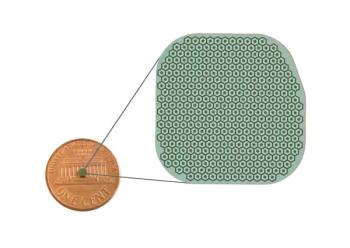
Ocular Therapeutix accelerates timelines for SOL-1 Phase 3 trial of Axpaxli for wet AMD
The study is now expected to be fully enrolled with all 300 patients randomized by the end of 2024.
Biopharmaceutical company Ocular Therapeutix has announced accelerated timelines for its SOL-1 Phase 3 registrational clinical trial of Axpaxli for wet age-related macular degeneration (AMD).1 The study is now expected to be fully enrolled with all 300 patients randomized by the end of 2024, with topline data now expected during the fourth quarter of 2025, according to a news release. Prior guidance for Ocular Therapeutix was to complete enrollment by the end of the first quarter of 2025.1
““Thanks to our phenomenal team and their relentless dedication, we are thrilled to announce the acceleration of our timeline for SOL-1, which is now expected to complete randomization by the end of 2024. With this update, we can now confirm that we expect topline data to be available during the fourth quarter of 2025,” said Pravin U Dugel, MD, executive chairman, president, and CEO of Ocular Therapeutix, in the release. “The exceptional pace of SOL-1 recruitment reflects the strong continued interest from investigators and patients in Axpaxli’s potential to significantly alter the wet AMD treatment paradigm. In total, the Ocular team activated over 100 clinical trial sites for SOL-1, and we are extremely grateful for the continued high-quality collaboration of our outstanding study sites. We are especially proud to provide this update given the initial perception that SOL-1 was going to be a difficult trial to enroll. Based on our feedback to date, there is even stronger enthusiasm to enroll patients in our repeat dosing study, SOL-R, and we believe the strength of our clinical team will be instrumental to the execution of both trials. This increasing momentum brings us closer to our goal of improving the lives of patients suffering from wet AMD.”
Ocular Therapeutix expects its current ongoing Phase 3 clinical program, which includes both the SOL-1 superiority study and SOL-R repeat-dosing non-inferiority study, to form the basis of the company’s regulatory filing for Axpaxli for the treatment of wet AMD, if successfully completed, the release stated.
SOL-1 is being conducted under the Special Protocol Agreement with the US FDA with the primary endpoint is the proportion of subhects who maintain visual acuity, defined as <15 ETDRS letters of best corrected visual acuity loss, at week 36 of the trial. After enrollment, patients receive 2 loading doses of aflibercept (2 mg), one at week -8 and another at week -4. Those who achieve pre-defined visual acuity measures are then randomized on day 1 of the trial to either receive one Axpaxli implant (450 µg) or one aflibercept (2 mg) injection.1
“Patients with wet AMD need treatment options that offer more durable improvements in visual outcomes. SOL-1 enrollment has advanced at such a rapid pace because Axpaxli is seeking to directly address this critical unmet need, offering the promise of a significantly reduced treatment burden,” said David A Eichenbaum, MD, FASRS, director of research at Retina Vitreous Associates of Florida, in the release. “SOL-1 and SOL-R are thoughtfully designed complementary trials, which have the potential to deliver meaningful insights on durability, repeat dosing, and comparability to standard-of-care treatment, while meeting FDA regulatory requirements. With SOL-1 soon to complete randomization, I am excited to now enroll patients in SOL-R. I believe patients in the SOL-R study will take comfort in knowing they are receiving an active treatment, regardless of which arm they are randomized to, while the study design mitigates the risk of unmasking from sham injections. I have enjoyed collaborating with the new clinical team at Ocular, whose dedication to patient care, regulatory alignment, and commitment to optimizing the clinical trial process creates an exceptional experience for patients and investigators. Assuming successful trial outcomes and approval, Axpaxli would offer the promise of a durable treatment option without compromising the rigorous standards for safety and efficacy that the retina community has come to expect.”
Reference:
Ocular Therapeutix announces accelerated timelines for SOL-1 registrational trial of Axpaxli in wet AMD. News release. Ocular Therapeutix. October 15, 2024. Accessed October 17, 2024.
https://investors.ocutx.com/news-releases/news-release-details/ocular-therapeutixtm-announces-accelerated-timelines-sol-1
Newsletter
Want more insights like this? Subscribe to Optometry Times and get clinical pearls and practice tips delivered straight to your inbox.



























